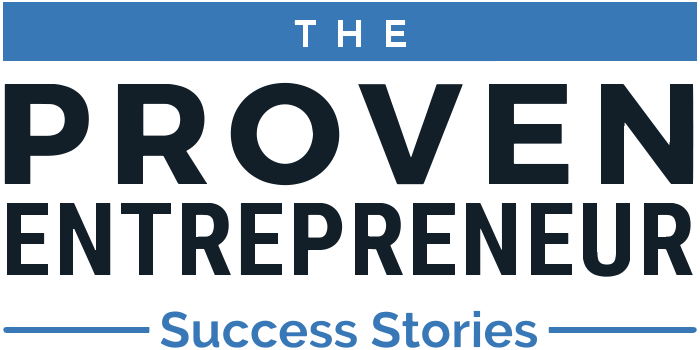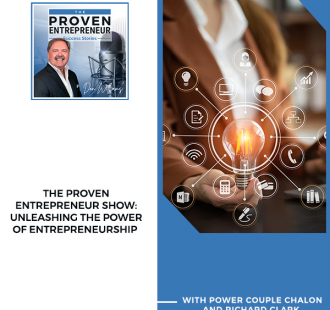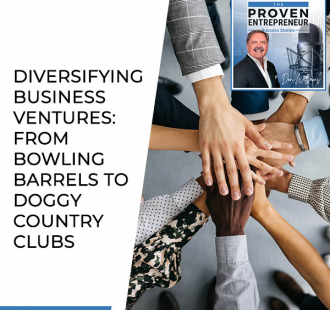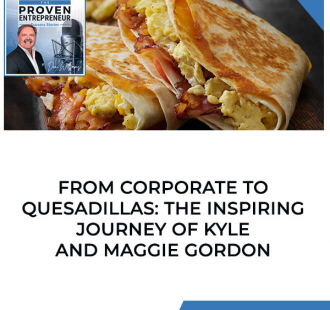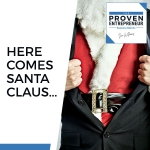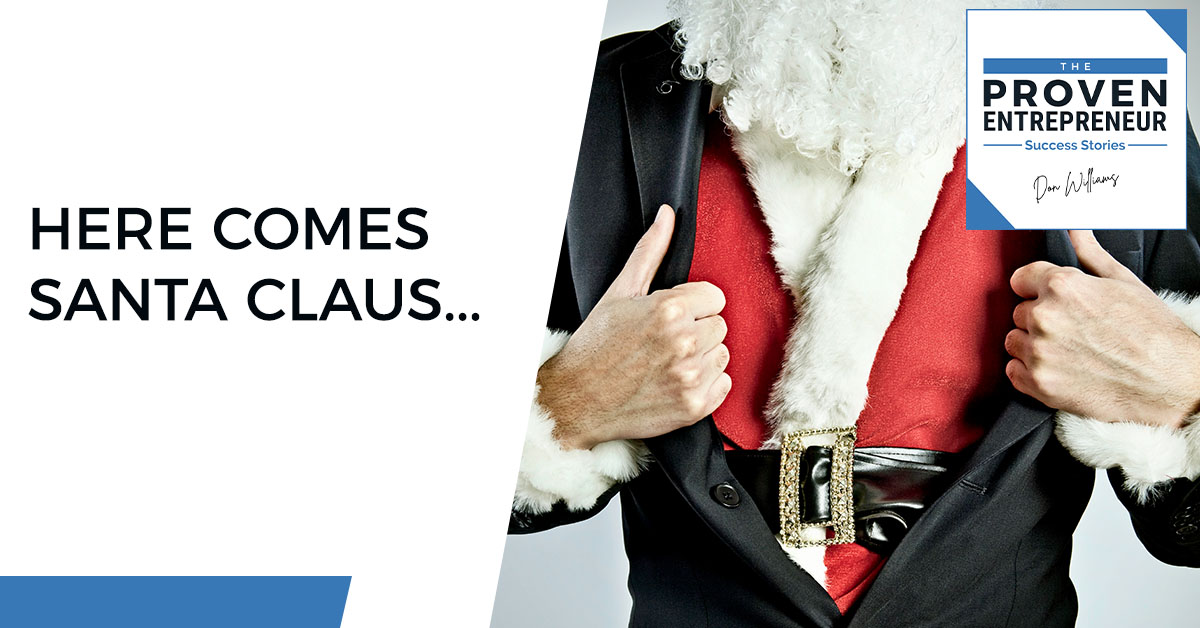
What’s the secret to landing a Shark Tank Deal with Barbara Corcoran? Here to share his wisdom and experience is Mitch Allen, the Founder and Head Elf of HireSanta. This is far from Mitch’s first-hand in entrepreneurship, but the failures and the many lessons he learned along the way brought him to his success now. Tune in as he joins Don Williams to share the ups and downs of his entrepreneur journey.
For information on how to work with Don visit Work With Don Williams
You can also reach out to Don Williams at https://donwilliamsglobal.com
Please join Don and his businesses in support of St. Jude’s Children Research Hospital in its Mission to cure Childhood Cancers. You can donate to St. Jude at stjude.org/donate
—
Listen to the podcast here
Here Comes Santa Claus…
Mitch Allen aka “Santa” Allen Lands ABC Shark Tank Deal With Barbara Corcoran
I’ve got my good friend, Mitch Allen as our first guest. Mitch has started over ten businesses for several years. In 2019, he had a successful exit from a company he founded in 2001 by the name of LeadRival, which he sold to a competitor. You might recognize Mitch from his many appearances on ABC Shark Tank. He appeared on Shark Tank with his company HireSanta and struck a deal with Barbara Corcoran. Mitch, welcome to the show.
I’m so glad to be here, Don. Thanks for having me.
It’s my pleasure. Thank you so much. Let’s start. What are you doing? What’s your passion? What are you working on?
My passion is entrepreneurialism. I love thinking about businesses and talking to people about how they make money. Also, reading about businesses and trying to implement the things that have worked for other people in my businesses. My main business since I’ve sold LeadRival is HireSanta. In HireSanta, we help brands associate themselves with Christmas, primarily through the use of the holiday entertainer, Santa Claus. We staff Santa Claus entertainers around the world.
When you staff Santa Clauses, does that mean I have a Christmas party and I can have Santa at the party or I own a chain of retail stores and I can have Santas in my stores or all the above?
The answer is yes. We staff everything Santa-related. If you want Santa to come by on Christmas Eve for a 30-minute visit, we can do that or up to a full season event, which is about 400 hours starting. Usually, the first weekend of November and runs through Christmas Eve. It’s anything in between staffing Santa. We also staff several big events where we staff Santa and Mrs. Claus.

Many times, we’ll have multiple Santas and multiple Mrs. Claus at a location, entertaining elves and hostess elves put on real productions. Our executive producers have tremendous experience in putting on very large events soup to nuts. What we got our start in is this home visit or company visit where you want to have a little bit of extra Christmas magic by bringing in a Santa Claus.
Where are you from? Were your parents entrepreneurial? Tell us a little bit about your childhood and your background.
In talking with hundreds of entrepreneurs through Entrepreneurs’ Organization, EO, I have found that many, if not most, 80% of entrepreneurs, their parents were entrepreneurs or maybe had a grandparent that was an entrepreneur that was able to see what it’s like and have that possibility. My parents were not entrepreneurs. They were educators. My mom was a teacher in the fourth grade and my dad was an elementary principal.
I grew up in a very small town, Denver City, Texas, out in the middle of West Texas, about 80 miles South of Lubbock. It’s a little bit of an oil and gas town and had a traditional small-town Texas upbringing. It’s a little town with 4,000 people. My wife is from even a smaller town, Sundown, Texas. It’s one blinking light town of about 1,000 people. We’re a small-town Texas but we lived here in the Metroplex South Fort Worth area for many years on the Fort Worth side of things.
My background, I come from a town of about 1,100 people. When the fair was there, everybody was in town. Maybe we were counting the cats and dogs too. I’m not sure. My parents were not entrepreneurial until after I was. Talk about work ethic. I won’t put any words in your mouth. As a young boy growing up in Denver City, Texas, talk about your first job and what work ethic your parents instilled in you.
I played tennis as a child and in college as well. It’s my job in a small town. I was going to tennis tournaments almost all summer but I always had this notion of hustling. It wasn’t necessarily about making money but it was about doing something and the reward of it was making money. It was a job, though. I had my best friend and later my business partner for several years in LeadRival lived across the street. He’s a couple of years younger than me. We roofed houses. We started when I was fourteen and we did that for a couple of years as my first real job.
For every successful business, there are twenty businesses that fail. Click To TweetWe were roofing houses, only the two of us, on top of a roof of Denver City, Texas, stripping shingles, nailing them down, 110-degree weather all day every day. It was brutally hot. That’s one of those jobs that always say that teaches you character type of thing. My parents worked hard as teachers but for me, I always wanted to do something. I bought and sold baseball cards, comic books and old ‘50s and ‘60s Coke machines. We did a lot of things. We were hustling. Once I got to grad school, I bought and sold rental properties. It was always this notion of hustling a little bit but it was more about finding something interesting to do other than almost anything else.
Talk about your next path. You went on to school, military or Merchant Marine. What’d you do?
I went to school and studied mathematics. I did not know what I wanted to do. I got a degree in Mathematics and then I went to grad school. I got a Master’s in Applied Mathematics, worked towards a PhD in Applied Mathematics and then decided, “I should get a PhD in Statistics.” I was working on my dissertation in Applied Mathematics and switched to Statistics. I went through all the courses and tests to get a PhD in Statistics. I was working on what they call ABD, All But Dissertation in Statistics. I got married and dropped out of school because I didn’t want to be a professor anymore.
I thought I wanted to be a professor. I love teaching. I still might go back and teach at some point but I did not like research. At the time, my idea of doing research is there was somebody who was holed up in their office, smoking a cigarette, drinking coffee all day, every day. That did not appeal to me. I enjoy teaching but the research I was not good at and didn’t have any passion for. I got a job with a company that then got bought by CityGroup doing statistical analysis and model building for them.
Your first job out of college was entrepreneurial. You went to work for a big company and eventually, full rolled up into the city, the credit business and somehow. Tell us how you started your first business then. What was your first real business? Even though at fourteen roofing houses, that might be a real business.
When people ask me about my businesses, I’m like, “I’ve got 3 real businesses,” even though I may have 7 or 8 technical businesses. In grad school, my partner and I had six rental properties. That was a real business, even though we were not treating it like a real business. I remember when we handed over “our books” to one of our other partners in LeadRival. It was a spiral notebook in that I had written down some things. It was awful. It had no accounting because I didn’t have a business background at all and hadn’t even thought about it. That was a real business. We ended up buying an apartment complex, a small C-minus-minus apartment complex that pretty much lost all the money that we’d made in the awesome minds we made in rental property.

With the first real business, my partner was an attorney and so we started a small local bankruptcy law practice in Fort Worth. That was a real business. That’s when I left CityGroup at the time to join full-time and then we started an advertising company that became LeadRival after that. That’s what started. Many of my businesses were what I call adjacent businesses. I have a business and then we vertically integrate the whole thing. We’re spending 35% of our money giving to somebody else to do our advertising. It’s not that hard to place TV advertising, direct mail or Yellow Pages. We’re like, “Let’s start an advertising company.” That’s how we started LeadRival, the internet came and we were off to the races.
Taking things that are cost and turning them into income-producing.
That’s the theory.
I love that early entrepreneur who kept books in a notebook. I’ll tell you a funny story. My grandfather who owned about 400 rental properties kept his books in brown grocery paper bags because he was too tight to buy paper. There’s some benefit in being frugal. Your business HireSanta, tell us how you got started there.
With all my businesses, HireSanta is the most of my business. Many entrepreneurs I find hate partners or have some story or thoughts about partners. I love having partners because partners in many ways, whether it’s an actual equity partner or a key executive that maybe has some equity or Phantom shares of some sort, can be additive to myself and be strong in things that I’m not doing. For most of the businesses that I have or have had, I’ve had 1 up to 5 partners that help to do things that I’m not good at, whether that be customer service, managing the call center, doing books, financial stuff or whatever it is.
HireSanta is a business that I started myself. I’ve done everything until I got a deal with Barbara on Shark Tank. It was started strangely enough from a nonprofit that I started in 2005 with some other people. In 2008, my executive assistant asked me to dress up as Santa and hand out Christmas bonuses at our Christmas party. We had, at the time, nice Christmas parties. It was a lot of fun. Fun was one of our core values.
A lifestyle business is a business that funds a lifestyle. Click To TweetThat same year, I went and did a cookie decorating party for my daughter that my wife had every year when they were young. I was hooked on Christmas and being Santa. This reflected love or the love that the kids have. The faith, joy and magic of Christmas are magical. Expressing it to you like Santa, not only to your kids but to everybody else is magical. I looked terrible as Santa goes. I’m a Santa snob now.
Our clients want the best Santas so we try to have great-looking Santas. Being an all-in type of guy, I became a top Santa on beard. Think of Tim Allen in The Santa Clause movies. Over the next 3 or 4 years, I appeared in some national TV commercials. I’ve since been in some of the biggest parades in the world as Santa and then got to this point where people are wanting to pay me surprisingly a lot of money to be Santa. I got too much business.
There was some business that I didn’t want to do, still good money but not the money that I wanted to work for. I then become an internet marketer. In 2012, I bought a variety of domains, including HireSanta.com and started doing internet marketing to generate leads for Santa Claus around the country. I formed the company in 2012 and off to the races since then. It is growing at a good clip ever since.
I saw your first presentation episode on Shark Tank. How many Santas did you have on stage?
I had around 20 Santas, Mrs. Claus and 2 mascots.
You’ve been an entrepreneur for several years. You started as a kid. What about a hard lesson? Something you learned along the way and there are probably several but pick one that you’d share with us.

I’ve got a bunch of lessons. I’ve talked several times about the lessons of being an entrepreneur. Everybody has this survival ship bias about entrepreneurs, particularly in EO, Entrepreneurs’ Organization. Everybody’s business is at a successful level. For every successful business, twenty businesses fail. Being an entrepreneur is very difficult. It’s not nearly as easy. One of the lessons that many entrepreneurs get into and people think about entrepreneurship is the notion of a lifestyle business isn’t an entrepreneur in some way.
That’s false. Being a lifestyle business, there’s an entrepreneur that funds that lifestyle. It may not be a hundred-million-dollar business or a billion-dollar business but it can be a great business that can fund your lifestyle, provide security, maybe even provide jobs for kids or grandkids or whatever happens to be. It’s a business that funds a lifestyle. Along the way, I’ve had lots of business lessons, especially with businesses that have failed.
The number one thing is about knowing how you make money and acquire clients. Acquiring clients is always the hardest thing to do. One of my businesses that we were going to spin off from LeadRival was to do credit monitoring. From LeadRival, as a secondary source, we sold credit monitoring leads to a third party, one of the biggest credit monitoring places. We’re making a good amount of money selling leads to these things the same way. This is something that’s a pack of commodities in some ways. If we’re making a little bit of money by selling the leads, I bet we can make a bunch of money by doing the whole thing.
“Let’s be our own customer.” We created our credit monitoring service. It’s called Identity Cred. In essence, we white label. Somebody is doing it themselves. For a variety of reasons, we weren’t able to capture it in the same way. My number one reason to start a company is we have a low-cost source of leads. We have an unfair advantage to acquire clients.
We didn’t. I didn’t understand how we would acquire clients that were not only ours but other people. That’s my biggest lesson. When I talk to new entrepreneurs, I always ask them, “How are you going to acquire clients? It’s unfair or maybe it doesn’t sound right but how are you going to do it cheaper than everybody else? Everybody can go onto Google and spend $1 million and acquire $600,000 worth of clients but how are you going to acquire clients less expensively than your competitor or any competitor out there?” My biggest thought and lesson whenever I wanted to open or think about a new business is, “Do I have a competitive advantage in acquiring clients?”
In my consulting business, I pretty much worked with people on the sales side. I can do the other stuff but I don’t want to. My theory is if we bring in enough dollars, half of your problems will evaporate and the other half, you can afford to fix. It’s a lot simpler.
Sales cures all things. Click To TweetThat’s a sales grid result. One of the things that I said in one of our businesses for a long time was about the profitability of our business. The saying I had, the Yogi-ism is, “If we weren’t so profitable, we wouldn’t be in business.” We probably have decent margins but we don’t know it because we got all these holes that are in our funnel that we’re losing money. In the end, we have a little bit of money left. If we weren’t so profited at the top, we wouldn’t be making money at all. Sales cures all things.
What about a work speed moment? In one of your businesses, things are going fairly well and all of a sudden, 1, 2 or 3 things fall into place where you explode.
I’ve had several moments like that. Both in the law firm that I was working in for a while, a nonprofit, as well as in LeadRival, some of that has to do with regulatory. This will harken to another one of the business lessons that I’ve learned as an entrepreneur. Regulatory laws changed for filing bankruptcy in 2005, the consumer protection or bankruptcy protection.
Consumer protection and bankruptcy laws went into effect in September and October of 2005. Everyone rushed to file for personal bankruptcy before the laws changed because it came more difficult. During that time, it was a madhouse for 6 or 9 months about people filing for personal bankruptcy. The laws didn’t change it too much but the perception was. There was a rush to filing, gearing up and getting everything put into place. It was very difficult. At times, I wanted to tap on the brakes.
One of my lessons about this was to make money when you can because making money is much harder than most people think. To make money consistently over a long period is difficult. When you can make money, you should make money. We could have stayed open longer but we turned people away. We should not have done that at the time because, for the next 2 years, bankruptcy filings were down a huge amount, 100% it ever happened. It gradually increased over the next 2 or 3 years. Making money when you can is super important because you never know when it’s going to stop.
I’ve seen so many marketers have a successful marketing plan and then tap the brakes and say, “We’ll do that business next year.” Maybe you will but maybe you won’t. It’s best to make it happen while it happens. Think back, if we could put you in a time machine and you could go back and talk to twenty-year-old Mitch, which you only have a couple of minutes and you can only tell yourself one piece of advice, what would that piece of advice be that would help you on your entrepreneurial journey?

When I talked to people, I used the word scared, fearful or frightened about whatever it happens to be. I would say take more risks more often. My kids don’t see it this way at all. They think that I am outgoing, entrepreneurial, risk-taking or whatever happens to be. Most of that is learned, forced or whatever that adjective is about me. At the time, though I was very confident, I was not necessarily what most people would say is risk-taking.
To jump in with both feet and not be scared of whether it be failure, ridicule, whatever those words are as well but to be more risk-taking, do that sooner rather than later because it is so much easier to be an entrepreneur when you’re young versus old. I’ve talked with many people who are our age about being an entrepreneur. They’re like, “I’ve got this idea.” I’m like, “Go do it,” but they can’t because they have two kids, a dog and a cat in the house and these huge obligations but when you’re 20 or 25, living on ramen, it’s so much easier because your obligations are so much less to be thinking entrepreneurial then and try it for 2, 3, 5 or 10 years. You can always go back to the other stuff but once you have the golden or bronze handcuffs, it’s hard to break free, go off and start something.
I heard two nuggets in there. 1) Take risks. 2) Push your fear aside. One of my favorite quotes is, “You’re far better, far stronger and far smarter than you think.” That was the wise Winnie-the-Pooh and that’s a good one.
Entrepreneurs will get this but I don’t view what I do or what we do as risky in the same sense maybe if somebody hasn’t started a business. When I start a new business, say when I started HireSanta, from a tax perspective, it was considered a hobby. I already had revenue and leads and understood the inventory side of it. I also had some diversification in other businesses. For all intent a person starting HireSanta, there was zero risk.
Many times when people think about an entrepreneur, they think that’s a risky thing when it’s not. Most entrepreneurs are risk-averse from a money perspective. The risk is you may not succeed in the way you want to. It will take longer than you think it’s going to be. That is slightly different than maybe what most people think about risk.
If you could ask one thing from this show’s clan or tribe about how we could support you, what’s one thing you’d ask for you?
Take more risks more often. Click To TweetSupport me as we’re making a big push on social media. We are trying to leverage the collateral that we have. Be part of the HireSanta community, whether that’s @HireSanta on Instagram or Facebook. We’re making a big push in 2021 and 2022 to push out. Always, if you need Santa to come. We’re also looking to expand the number of big events we do like putting on parades. We’ve got some amazing executive producers to put on huge events so we’re going to have to put on huge events. We’re looking to always put on even bigger and better events. We’re always looking for clients.
For anything Santa-related, reach out to HireSanta.com. You can find all the social media tags on the website. Mitch, if somebody wanted to reach out to you directly, what’s the best way to do that?
It’s the same thing. Monitor and get promoted to that but you can also reach me at my email address, Santa@HireSanta.com.
Should we give a plug for EO?
Yes. I’ve been in EO for a long time. It has been life-changing, not only for my business. When I talk to new people about EO, Entrepreneurs’ Organization, the reason I joined and they joined is typically 100% business-related and it’s about a forum. Whenever somebody is pitching it to somebody else, it’s like, “Getting a forum in this mastermind type group or this board of directors will help you grow your business. The learning events are amazing.” People who’ve been in more than five years often say it has changed them from a personal standpoint. There’s this interpersonal growth. For me, that has been done in spades. Since I joined, I’m an entirely different person and a lot of that is from the people, the places and the things that I’ve done through you.
I’ll second Mitch’s thoughts. I do think most entrepreneurial organization members join to improve their business. What’s most find as the easiest way to improve your business is to improve yourself. All boats ride higher in a full lake, things go better. Mitch, I want to thank you so much. That’s it for this episode.
Important Links
- LeadRival
- HireSanta
- Barbara Corcoran
- Entrepreneurs’ Organization
- First Presentation Episode – YouTube
- @HireSanta – Instagram
- Facebook – HireSanta
- Santa@HireSanta.com
About Mitchell Allen
 Head Elf at HireSanta, which was featured on Shark Tank and struck a deal with one of the Sharks! We craft unique, memorable Santa experiences in venues of all shapes and sizes all year long.
Head Elf at HireSanta, which was featured on Shark Tank and struck a deal with one of the Sharks! We craft unique, memorable Santa experiences in venues of all shapes and sizes all year long.
Experienced Partner with a demonstrated history of working in the legal services industry. Skilled in Search Engine Optimization (SEO), Sales, Entrepreneurship, Strategic Partnerships, and Pay Per Click (PPC). Member of EO since 2006. Previous member of YPO.
For information on how to work with Don visit Work With Don Williams
You can also reach out to Don Williams at https://donwilliamsglobal.com
Please join Don and his businesses in support of St. Jude’s Children Research Hospital in its Mission to cure Childhood Cancers. You can donate to St. Jude at stjude.org/donate
